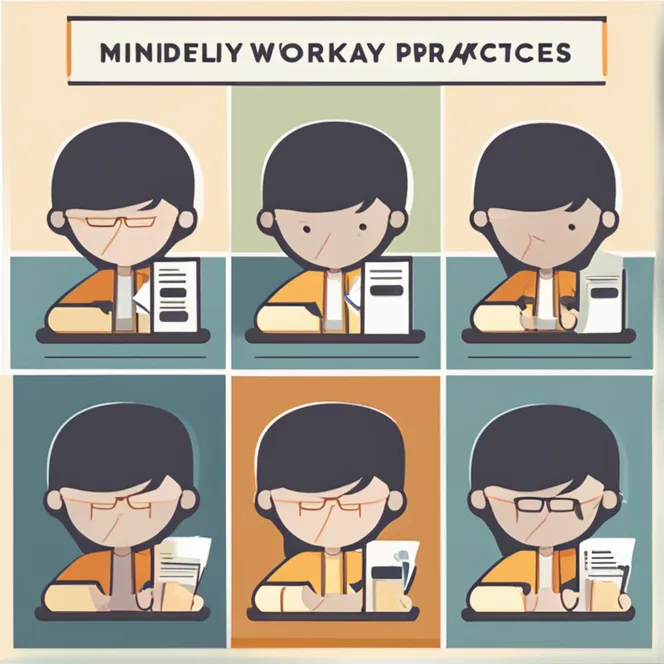
Mindful Workday Practices
Discover how integrating mindfulness at work can enhance focus, productivity, and well-being.
article by Hina Kurosawa
Embracing Mindfulness at Work
Mindfulness in the workplace is more than just a trend; it's a practice that can lead to significant improvements in concentration, job performance, and job satisfaction. The fast-paced work environment often triggers stress and hampers productivity, but cultivating a mindful approach can serve as an antidote to these issues. By being fully present and engaged in the here and now, employees can manage their workloads more effectively. This article explores simple yet impactful ways to incorporate mindfulness into your daily work routine. Starting your day with a clear intention can set the tone for a focused and productive day ahead.

Setting the Stage
The first step to a mindful workday begins before you even reach your desk. Take a moment each morning to center yourself with deep breathing or meditation. This practice can help to clear your mind and reduce feelings of anxiety or overwhelm. Not only does this set a precedent for the day, but it also activates the parasympathetic nervous system, fostering a sense of calm. Once at work, create a clean and organized space, which can help minimize distractions and make room for clarity. A tidy workspace can reflect a clear mind, ready to tackle the tasks at hand.

Focused Task Management
Mindfulness can also extend to how we handle our workload. Multitasking, though often glorified in the workplace, can actually dilute our focus and diminish the quality of our work. By giving full attention to one task at a time, you can improve the quality of your output and reduce errors. Prioritize your tasks and allocate specific times to each, which can lessen the urge to flip back and forth between duties. Remember, when you're mindful, you recognize that every task, no matter how trivial it may seem, deserves your full attention and care.

Cultivating Mindful Communication
Mindful communication is another critical aspect of workplace mindfulness. Listen actively during meetings and conversations, giving your undivided attention to the speaker. This not only shows respect but also improves your understanding and response to information. Before replying to emails or engaging in discussions, take a brief moment to reflect on your intentions and words. Thoughtful communication helps avoid misunderstandings and builds a more supportive work environment.

Taking Mindful Breaks
It's essential to recognize when you need a break from work. Instead of reaching for your phone or browsing the internet, try taking a mindful break. Go for a short walk, practice deep breathing, or stretch your body. Engaging in these activities can help to reset your mind and reduce cognitive fatigue. Mindful breaks are not a waste of time but a productive way to recharge and return to your tasks with renewed focus and energy.
Handling Stress Mindfully
Stress is an inevitable part of work, but it can be managed through mindfulness. When stressful situations arise, take a step back and observe your thoughts and reactions without judgment. By recognizing your stressors, you can address them more constructively. Application of mindfulness techniques like focused breathing or visualization can calm the mind and provide a clearer perspective on how to handle challenging situations. Mindful stress management leads to less reactivity and more thoughtful responses to work pressures.
Published: 12/11/2023
Modified: 12/11/2023
More predictions
Come back here soon to learn more about yourself and your future


Exploring The Essence Of Meditation
Delve into the transformative world of meditation and uncover its profound impacts on mind, body, and spirit.


Mastering Calm: Meditation For Anxiety
Explore the serenity of mindfulness through meditation techniques designed to soothe anxiety and restore inner peace.


Eating With Awareness: A Mindful Approach
Discover the transformative practice of mindful eating to enhance your well-being and savor every bite.